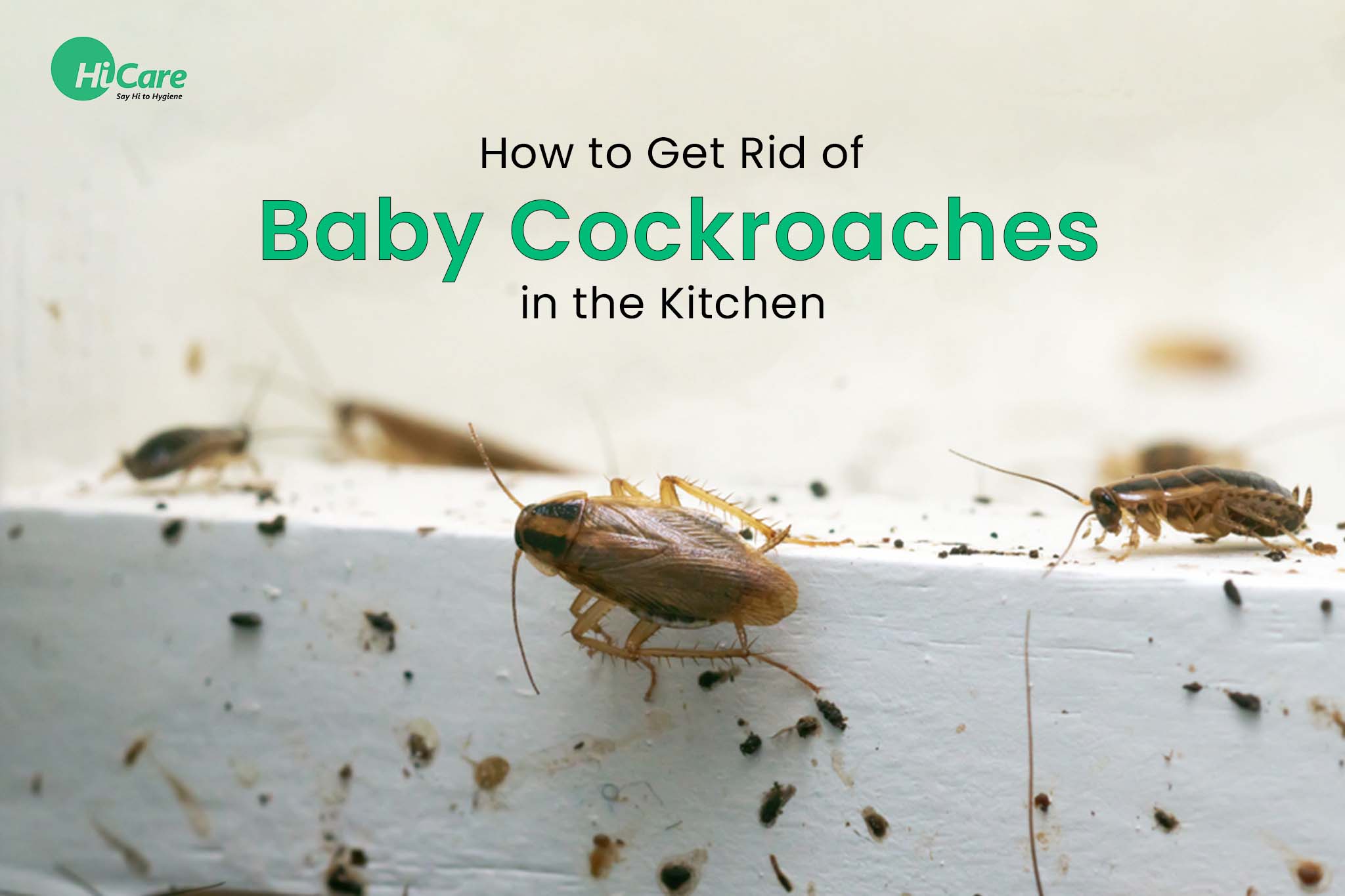Wondering how to finally get rid of cockroaches in your kitchen? It really comes down to a mix of deep cleaning, sealing up cracks, and using the right treatments. A roach problem is more than just annoying; it can actually impact your health. In this guide, we’ll walk you through exactly how to get rid of them for good—and keep them from ever coming back.

Image Source: hicare.in
Identifying the Enemy: Are Cockroaches Invading Your Kitchen?
Before you can declare war on these unwelcome guests, you need to confirm they’re actually there. Recognizing the signs of cockroaches in kitchen early on makes them easier to eradicate.
Common Signs of Roaches
- Sightings: Spotting live cockroaches, especially at night, is a clear indicator. They love dark, hidden spots.
- Droppings: These look like small, dark pellets (resembling coffee grounds or black pepper). They’re often found in drawers, under sinks, and behind appliances.
- Smear Marks: In areas with heavy infestations, you might see dark, irregular smear marks on horizontal surfaces and along walls.
- Egg Capsules (Oothecae): These are small, brown, purse-shaped casings that contain multiple cockroach eggs. Finding these is a sign of a breeding population.
- Musty Odor: A persistent, unpleasant, musty smell can indicate a large cockroach infestation kitchen.
Different Types of Cockroaches You Might Encounter
Knowing which type of cockroach you’re dealing with can help you choose the most effective treatment. Here are a few common culprits:
- German Cockroaches: Small, light brown, and the most common type found in kitchens. They reproduce quickly.
- American Cockroaches: Large, reddish-brown, and often found near drains and sewers.
- Oriental Cockroaches: Dark brown or black, and prefer damp, cool places like basements and drains.
- Brown-Banded Cockroaches: Similar in size to German cockroaches but with distinctive light brown bands across their bodies. They prefer warmer, drier areas.
Taking Action: Steps to Eliminate Cockroaches from Your Kitchen
Once you’ve confirmed the presence of cockroaches, it’s time to take action. A multi-pronged approach is usually the most effective way to get rid of roaches fast kitchen.
Deep Cleaning: The Foundation of Kitchen Cockroach Control
A clean kitchen is less attractive to cockroaches. Here’s a comprehensive cleaning routine:
- Clear Out Clutter: Remove everything from your countertops, cabinets, and pantry.
- Wash Everything: Wash all dishes, utensils, and cookware. Wipe down all surfaces with hot, soapy water.
- Clean Appliances: Clean inside and behind appliances like refrigerators, ovens, and dishwashers. Pay attention to crumbs and spills.
- Sweep and Mop: Sweep or vacuum the floor thoroughly, paying attention to corners and crevices. Mop with a disinfectant cleaner.
- Empty Trash Regularly: Use a trash can with a tight-fitting lid and empty it daily.
- Clean Drains: Pour boiling water down drains regularly to flush out any food debris.
Sealing Entry Points: Preventing Future Infestations
Cockroaches can squeeze through tiny cracks and crevices. Sealing these entry points is crucial for cockroach prevention kitchen.
- Caulk Cracks and Crevices: Use caulk to seal cracks in walls, floors, and around pipes.
- Seal Gaps Around Windows and Doors: Use weather stripping or sealant to close any gaps.
- Check Plumbing: Inspect pipes under sinks and look for leaks. Repair any leaks promptly.
- Cover Drain Openings: Use drain covers to prevent cockroaches from entering through drains.
Choosing the Right Weapons: Best Cockroach Killer Kitchen Options
Several effective cockroach control products are available. Choosing the right one depends on the severity of the infestation and your preferences.
Cockroach Bait
- How it Works: Cockroach bait for kitchens contains a slow-acting poison mixed with an attractant. Cockroaches eat the bait and carry it back to the nest, spreading the poison to other cockroaches.
- Advantages: Effective for killing large numbers of cockroaches, easy to use, and relatively safe for humans and pets when used as directed.
- Application: Place bait stations in areas where cockroaches are likely to travel, such as under sinks, behind appliances, and in corners.
Insecticide Sprays
- How it Works: Insecticide sprays kill cockroaches on contact.
- Advantages: Provide immediate results.
- Disadvantages: Can be toxic to humans and pets, may not be effective for reaching cockroaches in hidden areas.
- Application: Spray along baseboards, under sinks, and in other areas where cockroaches are likely to travel. Follow the instructions carefully and ventilate the area well.
Insect Growth Regulators (IGRs)
- How it Works: IGRs disrupt the cockroach’s life cycle, preventing them from developing into adults and reproducing.
- Advantages: Effective for long-term cockroach control.
- Disadvantages: Do not kill adult cockroaches immediately.
- Application: Available in sprays, baits, and traps.
Dusts (e.g., Boric Acid, Diatomaceous Earth)
- How it Works: Boric acid and diatomaceous earth are natural substances that kill cockroaches by dehydrating them.
- Advantages: Relatively safe for humans and pets when used as directed, long-lasting.
- Disadvantages: Can be messy.
- Application: Apply a thin layer of dust in cracks, crevices, and other areas where cockroaches are likely to travel.
Cockroach Traps
- How it Works: Cockroach traps kitchen lure cockroaches inside with an attractant. Once inside, they become trapped and die.
- Advantages: Easy to use, non-toxic.
- Disadvantages: Only effective for catching a small number of cockroaches, not suitable for heavy infestations.
- Application: Place traps in areas where cockroaches are likely to travel.
Natural Solutions: Eco-Friendly Kitchen Cockroach Control
If you prefer natural cockroach remedies kitchen, several options are available:
- Boric Acid: As mentioned above, boric acid is a natural insecticide that is effective against cockroaches.
- Diatomaceous Earth (DE): DE is a natural powder made from fossilized diatoms. It kills cockroaches by dehydrating them.
- Essential Oils: Some essential oils, such as peppermint, eucalyptus, and tea tree oil, are believed to repel cockroaches. Mix a few drops of essential oil with water and spray around your kitchen.
- Baking Soda and Sugar: Mix equal parts baking soda and sugar. The sugar attracts cockroaches, and the baking soda kills them.
- Bay Leaves: Cockroaches are said to dislike the smell of bay leaves. Place bay leaves in areas where cockroaches are likely to travel.
Strategic Deployment: Where to Place Treatments
The effectiveness of your chosen treatment depends on proper placement.
- Under Sinks: This is a prime cockroach hangout due to moisture and food debris.
- Behind Appliances: Refrigerators, ovens, and dishwashers provide warmth and shelter.
- In Cabinets and Pantries: These areas provide food and hiding places.
- Along Baseboards: Cockroaches often travel along baseboards.
- Near Drains: Drains provide access to water and sewers.
Long-Term Prevention: Keeping Cockroaches Away for Good
Eliminating cockroaches is only half the battle. You also need to implement preventive measures to keep them from coming back.
Maintaining Cleanliness: A Daily Habit
- Clean Up Spills Immediately: Wipe up any spills as soon as they happen.
- Wash Dishes Regularly: Don’t let dirty dishes pile up in the sink.
- Store Food Properly: Store food in airtight containers.
- Sweep and Mop Regularly: Keep your kitchen floor clean.
Reducing Moisture: Drying Up Their Water Source
- Fix Leaks Promptly: Repair any leaky faucets or pipes.
- Dry Wet Areas: Wipe up any standing water.
- Ventilate Your Kitchen: Use a ventilation fan when cooking to reduce humidity.
Regular Inspections: Catching Problems Early
- Check for Signs of Cockroaches Regularly: Look for droppings, smear marks, and other signs of infestation.
- Inspect New Items: Check boxes, bags, and other items before bringing them into your kitchen.
Choosing Professional Help: When to Call an Exterminator
If you have a severe cockroach infestation or if you’ve tried DIY methods without success, it’s time to call a professional exterminator.
Benefits of Professional Pest Control
- Expert Knowledge: Exterminators have the knowledge and experience to identify the type of cockroach and the extent of the infestation.
- Effective Treatments: Exterminators have access to professional-grade insecticides and other treatments that are not available to the public.
- Comprehensive Approach: Exterminators can provide a comprehensive pest control plan that includes eliminating existing cockroaches and preventing future infestations.
- Time Savings: Hiring an exterminator can save you time and effort.
Finding a Reputable Exterminator
- Ask for Recommendations: Ask friends, family, or neighbors for recommendations.
- Check Online Reviews: Read online reviews of exterminators in your area.
- Get Multiple Quotes: Get quotes from several exterminators before making a decision.
- Make Sure They Are Licensed and Insured: Verify that the exterminator is licensed and insured.
Fathoming Cockroach Behavior: Why Are They Here?
To truly win the war, it helps to understand why cockroaches invade your kitchen in the first place.
- Food: Cockroaches are attracted to food scraps, crumbs, and other organic matter.
- Water: Cockroaches need water to survive. They are attracted to moist areas, such as leaky faucets and damp basements.
- Shelter: Cockroaches need shelter from the elements and predators. They are attracted to dark, secluded areas, such as cracks, crevices, and behind appliances.
- Warmth: Many cockroach species thrive in warm environments.
Addressing Common Concerns
Are Cockroaches Dangerous?
Yes, cockroaches can be dangerous. They can spread diseases, contaminate food, and trigger allergies and asthma.
Can Cockroaches Survive Without Food?
Cockroaches can survive for several weeks without food, but they need water to survive.
Can Cockroaches Climb Walls?
Some cockroach species, such as German cockroaches, can climb walls and other smooth surfaces.
Can Cockroaches Fly?
Some cockroach species, such as American cockroaches, can fly short distances.
Conclusion
Getting rid of cockroaches in your kitchen requires a combination of cleaning, sealing entry points, using appropriate treatments, and implementing preventive measures. By following the steps outlined in this guide, you can eliminate these pests and keep them from coming back, ensuring a clean, healthy, and cockroach-free kitchen. Remember, consistent effort and vigilance are key to long-term success in your kitchen cockroach control efforts.
Frequently Asked Questions (FAQ)
Q: What is the fastest way to get rid of cockroaches in the kitchen?
A: The fastest way to get rid of roaches fast kitchen is a combination of thorough cleaning, targeted insecticide sprays, and strategically placed cockroach baits. However, for severe infestations, professional help is often the most efficient solution.
Q: Can I use bleach to kill cockroaches?
A: While bleach can kill cockroaches on direct contact, it’s not a practical or effective solution for eliminating an infestation. It doesn’t penetrate hidden areas, and its fumes can be harmful.
Q: What attracts cockroaches to my kitchen?
A: Cockroaches are attracted to food scraps, water sources, and dark, sheltered areas. Even small crumbs and drips can be enough to sustain them.
Q: How often should I clean my kitchen to prevent cockroaches?
A: Aim to clean your kitchen thoroughly at least once a week. Wipe up spills and crumbs immediately, and regularly clean under appliances and in cabinets.
Q: Are natural cockroach remedies effective?
A: Natural remedies like boric acid, diatomaceous earth, and essential oils can be effective for minor infestations or as preventive measures. However, they may not be sufficient for eliminating a large or established cockroach population.
Q: How do I know if my cockroach problem is severe enough to call an exterminator?
A: If you’re consistently seeing cockroaches despite your cleaning and treatment efforts, or if you’re finding egg capsules or signs of a large population, it’s time to call a professional.

Hi, I’m Larry Fish, the mind behind MyGrinderGuide.com.. With a passion for all things kitchen appliances, I created this blog to share my hands-on experience and expert knowledge. Whether it’s helping you choose the right tools for your culinary adventures or offering tips to make your kitchen more efficient, I’m here to guide you. My goal is to make your time in the kitchen not only easier but also enjoyable! Welcome to my world of kitchen mastery!
